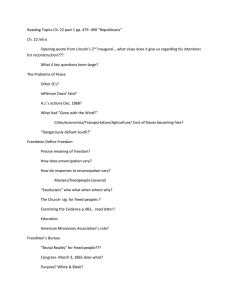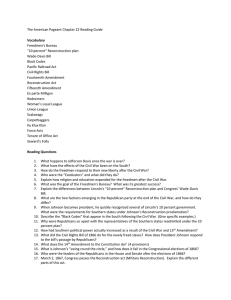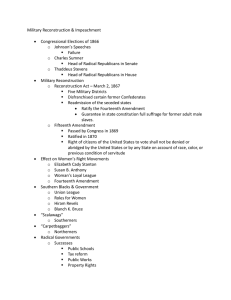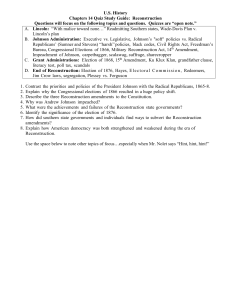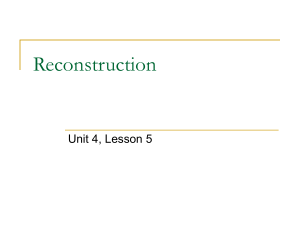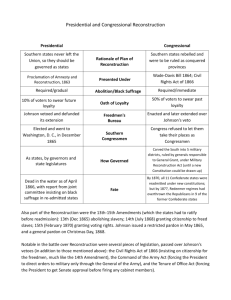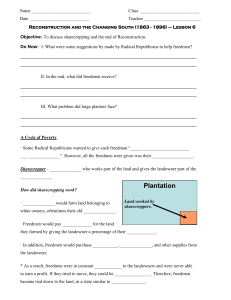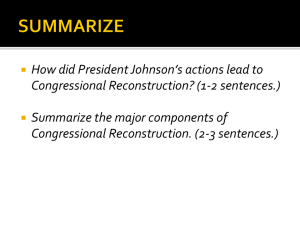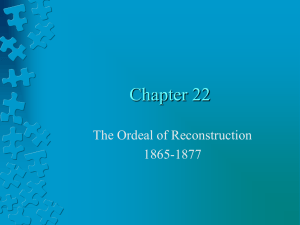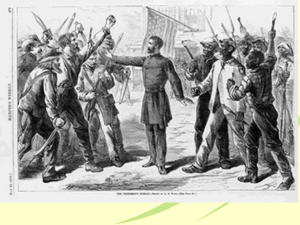Reconstruction - Team 9 Titans
advertisement
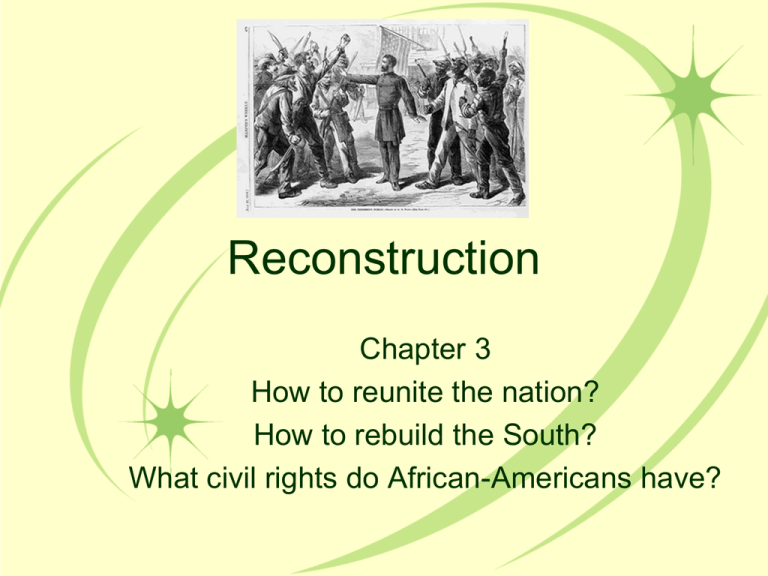
Reconstruction Chapter 3 How to reunite the nation? How to rebuild the South? What civil rights do African-Americans have? I. Presidential Reconstruction (1863-1866) A. Lincoln’s 10% Plan (1863) – 10% white Southerners must take loyalty oath – Must write state constitutions that ban slavery – Amnesty to most white Southerners who took oath (except Confederate leaders) – TN, LA, Arkansas form new governments but Congress refused to seat representatives Henry Davis Benjamin Wade B. Wade-Davis Bill (1864) – A majority of white Southerners must swear loyalty oath – Only white males who swore they had not fought against the Union could vote for delegates to state constitutions – New state constitution must ban slavery – Bars former Confederates from holding office – Lincoln refuses to sign bill (pocket veto) C. Johnson’s Restoration Plan (1865) – Similar to Lincoln’s plan of leniency – Grants amnesty to most Confederates after loyalty oath – High ranking Confederates must receive a presidential pardon – Southern states must denounce secession and ban slavery (ratify 13th Amendment) – 10 of 11 states were prepared to re-enter the Union under this plan II. Radical Republicans (1866-1873) Freedmen – Sharecropping Freedmen Family near home Freedmen Family without a home Black Codes – Vagrancy leads to chain gangs A. Freedmen in Trouble – 1. Black Codes • Southern states passed laws to control freedmen and trampled their rights – Restricted property ownership – Arrest if jobless – Not allowed to serve on juries Ku Klux Klan – 2.Violence: • Ku Klux Klan forms under Nathan Bedford Forrest in 1865 – Southern white males form groups to “terrorize” African-Americans • New Orleans, 1866 – Federal government selects a mayor who supports civil rights for African American – White mob forms and are aided by local police that attack African-Americans in the city • Memphis May, 1866 – – A confrontation occurs between local white police and recently discharged Union black soldiers – a white mob attacks also aided by local police and destroy B. Congressional Leaders 1. Thaddeus Stevens – Leader in the House of Representatives – From Gettysburg, PA – Formed a hatred of slavery from his law work in Maryland 2. Charles Sumner – – – – Leader in the Senate From Boston, MA Beaten in attack in Senate in 1856 Advocate for civil rights Preston Brooks attacks Charles Sumner in 1856 on the floor of the Senate C. Protection for African-Americans – 1. Freedmen’s Bureau – 2. Civil Rights of 1866 – 3. Fourteenth Amendment – 4. Fifteenth Amendment African-Americans Voting Role of the Federal Government Johnson Veto Against expansion of the power of the Freedmen’s Bureau D. Laws during Civil War 1. Internal Revenue Act 1862 – Income tax law created to raise taxes to pay for the war 2. Morrill Land Grant College 1862 – Each state received 30,000 acres of land – Money raised was to create colleges in state (URI) 3. Homestead Act 1862 – 150 acres for $10 if agreed to settle land for 5 years 4. Conscription Act 1862 & 1863 – Law required states to reach a certain number of soldiers 5. Pacific Railroad Acts of 1862 & 1864 – A route was selected to link the east and west by railroad Transcontinental RR Land Grant Colleges E. Election of 1866 1. President Johnson vetoes: – expanding the powers of Freedmen’s Bureau – the Civil Rights Act of 1866 2. Congress overrides both vetoes 3. Johnson and Congress do NOT compromise 4. Both go to the people to see who they supported in the Election of 1866 – “lenient” or “harsh” Reconstruction 5. Radical Republicans won an overwhelming majority in midterm elections F. Reconstruction Act of 1867 1. Radical Republicans pass a new law for Southern states: • Southern states divided into 5 military districts ruled by a military commander • Guaranteed rights of African-Americans to vote • Banned Confederate leaders from holding office • Required army to REGISTER voters and protect freedmen 2. To rejoin nation, Southern states had to: • Ratify the 14th Amendment • Submit new constitutions for Congressional approval Andrew Johnson consulted General Ulysses S. Grant before selecting the generals to administer the military districts. Eventually he appointed John Schofield (Virginia), Daniel Sickles (the Carolinas), John Pope (Georgia, Alabama and Florida), Edward Ord (Arkansas and Mississippi) and Philip Sheridan (Louisiana and Texas). G. Military Governments 1. At first, most white Southerners refused to participate in the new constitutional conventions 2. In the elections, African-Americans and some white voters elected new state governments with REPUBLICAN majorities 3. By 1868, Alabama, Arkansas, Florida, Georgia, Louisiana, North Carolina South Carolina were restored to the Union 4. By 1870 Mississippi, Virginia, & TX were restored H. Johnson’s Impeachment Congress passed a series of laws to lessen the powers of the president Tenure of Office Act of 1867: – The president could NOT remove gov’t officials without Senate approval Johnson suspended Edwin Stanton from the position of Secretary of War without “approval” The House of Representatives voted to impeach the president in March 1868 The Senate held a trial three days later and Johnson was acquitted (Rad Rep were one vote away from 2/3) Impeachment & Trial of President Johnson I. Election of 1868 Ulysses S. Grant (R-OH) v. Horatio Seymour (D-NY) A close popular vote but dominating electoral college victory for Grant Main issue: Reconstruction Grant Seymour Election of 1868 Grant (R) – 52.7% popular vote – 214 electoral vote Seymour (D) – 47.3% p.v. – 80 e.v. J. Revenge or Idealism Were Radical Republicans out for revenge? Were the Radical Republicans seeking meaningful reforms in the South? III. Reconstruction in the South A. African Americans Political Leaders • 16 African-Americans were elected to the House of Representatives • Hiram Revels and Blanche K. Bruce were elected Senators (see p88) • Never gained control of state governments • Only 10 African-Americans have ever been a governor of a state or U.S. Senator (4 are living today) African American Congressmen Freedman’s School 2. Education 1. The Freedmen’s Bureau – Established schools in the South • 50% white & 40% black children attended • Schools were segregated – Most teachers were from the North 2. Academies – Specialized schools to train skills develop into “Black Colleges” such as Fisk (WEB Dubois), Howard (Thurgood Marshall) & Morehouse (Martin Luther King) – http://www.infoplease.com/ipa/A0872606.html Education Graduates from “Black Colleges” Tenant Farming (Photographs taken in 1939) 3. Farming a. owning land – Freedmen’s Bureau established a bank to help former slave purchase land – Only small number of freedmen were able to buy land b. tenant farmer (sharecropping) – white landowner would rent a shack, land, seed and crude tools to tenant farmer – the tenant would pay landowner a “share” of the crop – the majority and the tenants lived in conditions worse than slavery B. The New South 1. New Industry – Henry Grady editor of the Atlanta Constitution believed the South needed more industry • “Out Yankee, the Yankees” – New manufacturing created using South’s resources of coal, iron, tobacco, cotton, and lumber – Encouraged a spirit of hard work and regional pride – Industry based in Alabama – Industry grows but not as great of the North (p96-7) 2. Rural Economy – Many large farms (plantations) were farmed by tenant farmers – Debt caused problems for most farmers – Too many farmers grew cotton – Most farmers are very poor Redeemers IV. Redeemers (1873-1876) A. Violence (terrorist groups) – 1.White League and Redshirts • Para-military groups that operated openly in intimidating freedmen, Republicans, and federal government officials • Allied with Democratic Party – 2. Ku Klux Klan (KKK) • Secret groups that intimidated and used violence to achieve their goals • First Grand Wizard is CSA General Nathan Bedford Forrest B. Corruption 1. Grant’s Administration – a. Credit Mobilier Scandal (1872) • Company uses bribes to get favorable railroad contracts • Many congressman and the vice-president involved – b. Whiskey Ring (1875) • Tax money is “funneled” illegally to whiskey distilleries • Grant’s private secretary is involved 2. “Carpetbaggers” and “Scalawags” • Southerners link corruption to the Northerners and Republicans in their states C. Liberal Republicans & the Amnesty Act 1. Republican Party splits over two issues: • Corruption • Reconstruction 2. Liberal Republicans form a party • led by Horace Greeley • challenge Grant in Election of 1872 • (Northern Democrats rally to Greeley) 3. Amnesty Act of 1872 – Law PARDONS almost ALL white Southerners – All pardoned could VOTE and HOLD OFFICE – Democratic Party in South regains power of state governments (by majority voting or terrorism) Election of 1872 Grant (Red) v Greeley (Blue) Republicans 286 Democrats 63 D. Panic of 1873 Panic is another word for Economic Depression Begins with bankruptcy of a powerful bank due to bad railroad investments “A panic” or wave of fear hits small banks who are forced to close Thousands of businesses close and tens of thousands of Americans lose jobs Republican leaders blamed for the economy In Election of 1874, Democratic Party gains seats in the Senate and gain control of the House of Representatives E. Democrats seize control in Southern States 1. “Reedemers” – “Old Aristocracy” such as large planters controls some states – “New Leaders” such as bankers and merchants control other states – All want to end the Republican control of their state governments 2. Conservative Policy – Cut state spending and lower taxes – End social policies and funding to schools F. Election of 1876 1. Rutheford B. Hayes (R) v. Samuel Tilden (D) 2. Tilden wins the popular vote 3. Electoral votes in 3 Southern states are in dispute Election of 1876 4. Congress awards all 20 elector votes to Hayes making him president 5. Hayes makes deal to end “Radical” Reconstruction and to pull army out of the South Election of 1876 Hayes 165* Tilden 184 (*All 20 disputed Electoral Votes awarded to Hayes given him the needed 185 to win) G. Divided Society 1. Voting Restrictions – Poll tax – Literacy test – Grandfather clause 2. Jim Crow Laws – Laws that created a segregated society in public places (school, restaurants, transportation) – Plessy v Ferguson 1896 - Supreme Court rules “separate but equal” as constitutional – Violence and intimidation enforced policy (lynching) – Brown v. Board of Education 1954 - S.C. rules such laws and policy as unconstitutional V. Legacy of Reconstruction What were the most important political changes during the Civil War & Reconstruction? What were the most important social changes during the Civil War & Reconstruction? What were the most important economic changes during the Civil War & Reconstruction? Were the Radical Republicans idealists or out for revenge and power? Was the Civil War worth fighting?
